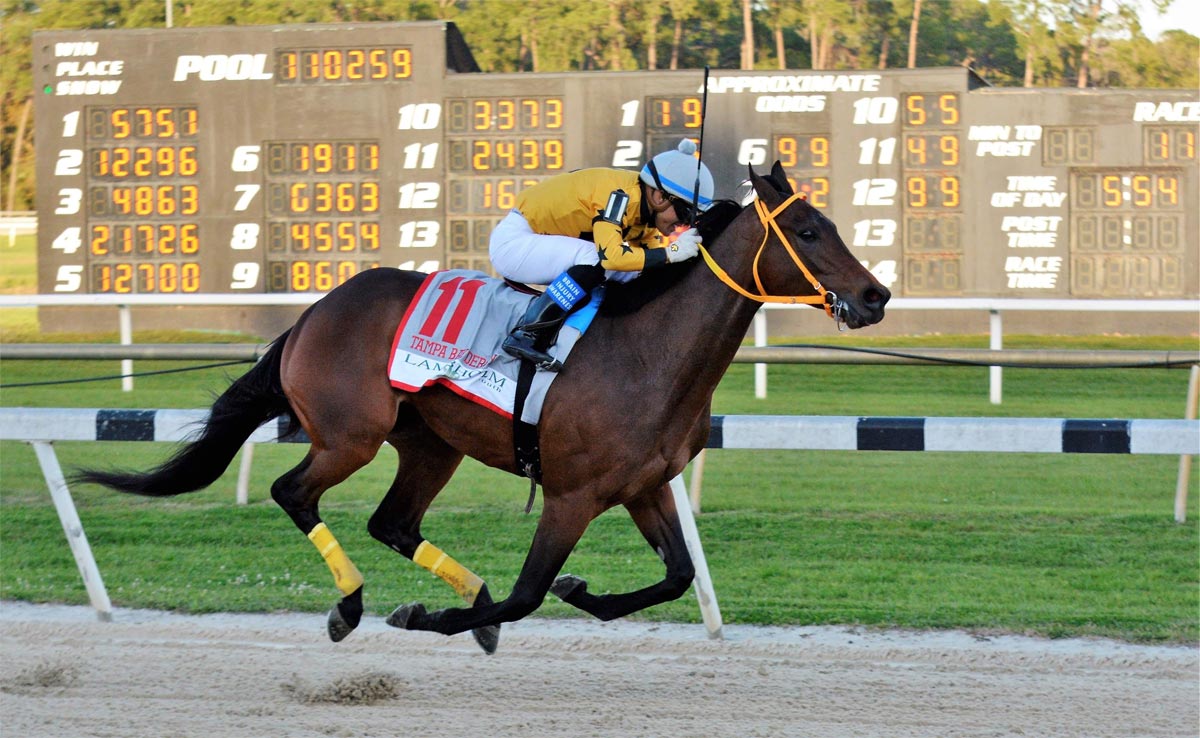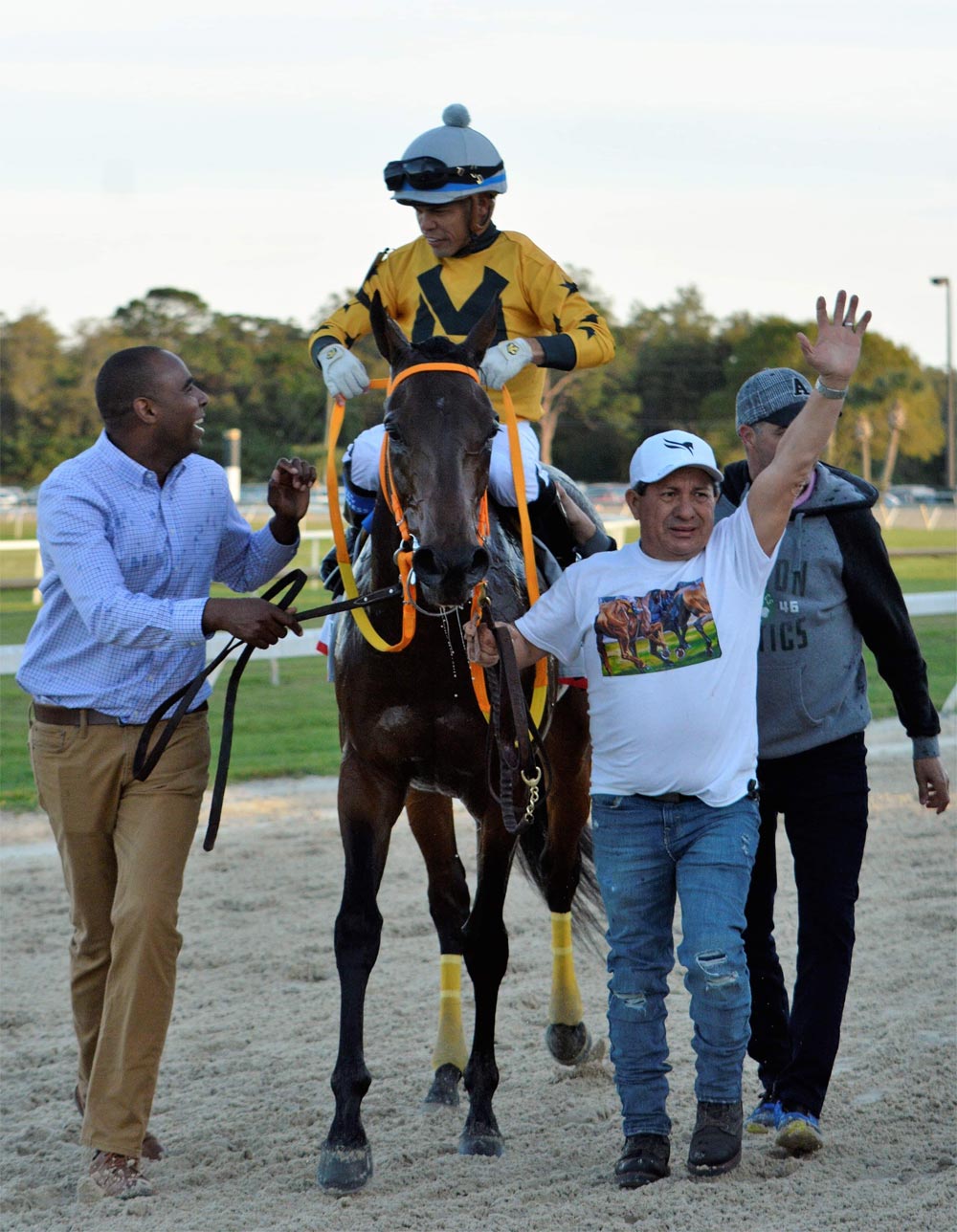When King Guillermo stepped onto the track for the Tampa Bay Derby (G2) on March 7, he carried much more than jockey Samy Camacho on his back. This horse is steeped in significance. Despite his 50-1 odds, King Guillermo attracted more attention than most longshots because he was fulfilling a childhood dream for his owner, former professional baseball player Victor Martínez.
Martínez retired from baseball in 2018 only to begin in Thoroughbred racing. Doubly significant, Martínez named King Guillermo after his late father, and he hoped the horse would bring honor to the name and to the family. As King Guillermo flashed across the finish line, impressively winning the Tampa Bay Derby, his all-Venezuelan team—owner Victor Martínez, trainer Juan Carlos Avila, jockey Samy Camacho, and groom and former jockey José Padron—knew they had something special.

King Guillermo streaking to victory in the Tampa Bay Derby. – Gonzalo Anteliz Jr. photos
If he wins this year’s Kentucky Derby (G1), it will not be the first time Venezuelan and American Thoroughbred racing histories have intertwined. For those that remember the incredible performance of the Venezuelan-trained Canonero II, who won the 1971 Kentucky Derby and the Preakness Stakes (G1), a Derby victory by King Guillermo would earn him fame in the United States and underscore the distinguished history of Venezuelan horse racing.
“I was young when Cañonero II won,” trainer Juan Carlos Avila said. “With King Guillermo, we are trying to do what a Venezuelan team has not done since 1971.”
The 1971 Kentucky Derby belonged to Venezuelan-trained Cañonero II, although few predicted it. The most positive description journalists ascribed to the colt was “the mystery horse.” The future-book odds placed him at 500-1, even though he was sent off at 8-1 odds as part of the pari-mutuel field in the Derby. In truth, Cañonero II, a Kentucky-bred, was returning to his birthplace to race. He had been sold inexpensively to a Venezuelan agent as part of a group of horses and then resold to Pedro Baptista in Venezuela. However, at the 1971 Derby, the Venezuelan colt sired by Pretendre, an English-bred stallion, and out of Dixieland II, garnered little more than insults in Louisville.
Few understood Venezuela’s excellence in horse racing or knew that the Venezuelan Thoroughbred champion Victoreado won the first international Caribbean Derby in 1966, just five years before Cañonero II would win the Kentucky Derby. Venezuela was in its Golden Age of horse racing in the 1960s and 1970s, and Cañonero II had been expertly trained by Arias, running against older and more formidable rivals at La Riconada Racetrack in Caracas. In fact, Cañonero II was the only horse among the 1971 Derby contenders who had already run and won at 1 ¼ miles, the distance of the Kentucky Derby.
The trip from Venezuela to Kentucky was a harrowing one, and Cañonero II lost 70 pounds while in transport and quarantine. Arias was unwavering in his belief in Cañonero II and did not push the horse. “Just relax, go eat, and we’ll wait for tomorrow,” Arias would say if the horse was not eager to train. Cañonero II did just that, gaining back 50 of the 70 pounds he had lost in transport.
Cañonero II had a team—owner and businessman Pedro Baptista, trainer Juan Arias, and groom Juan Quintero—that worked hard and believed in him. Before the Derby, Arias explained his training methodology: “Most American trainers train for speed. I train Cañonero II to be a star; a horse of depth who can be ridden in front or from behind. They say I work my horse too slow. Let’s see if he runs that slow on Saturday. I can learn from American trainers, but I can also teach them some things.”
Cañonero II did attract a very distinguished fan, Robert Kleberg of King’s Ranch in Texas. An expert in cattle and Thoroughbreds, Kleberg had owned two previous Derby winners—Assault (1946) and Middleground (1950). Kleberg stood in the paddock on Derby day, scrutinizing the contestants. After 10 minutes of careful observation, Kleberg said, “That number 15 is just about the best-looking colt I ever saw. Who is he anyway?”
Ramon Dominguez interviews the connections of Canonero, 1971 Kentucky Derby winner. Video credits: Written by Stephen Glantz and Larry Rosen. Executive Producer: Larry Rosen. Producer and Director: Andy Baltimore. Co-Producer: Shep Meyers. Film Editor: George T. Norris. Photography Director: Miguel A. Nazario.
As the race began, under the direction of Venezuelan jockey Gustavo Avila, Cañonero II fell to the back of the pack, running 18th of 20th early on until he began to pass the field, taking the lead from Eastern Fleet and Bold and Able. Cañonero II went on to win the Kentucky Derby by 3 ¾ lengths ahead of Jim French. The Venezuelan delegation already had their sights set on the Preakness. Cañonero II would win again, taking the second leg of the Triple Crown after dueling with Eastern Fleet down the backstretch and setting a new track record of 1:54, breaking Nashua’s mark set in 1955. “A-vi-la! A-vi-la!” the crowd chanted as the jockey paraded his victorious colt before the ecstatic fans.
Cañonero II and his team, now famous, turned their attention to the Belmont Stakes (G1). The horse ran in the final leg of the Triple Crown but fatigue and a case of thrush he had been battling since arriving in the U.S. had weakened him. Cañonero II finished fourth, behind horses he had already beaten twice in the previous races.
Kleberg bought Cañonero II for $1.5 million following the Belmont. Cañonero II’s accomplishments that season earned him the prestigious Eclipse Award as Champion 3-Year-Old Colt, setting a high bar for the inaugural year of the Eclipse Awards in 1972.
Cañonero II’s immense popularity brought about a resurgence of interest in the sport with his incredible victories and cultivated a broad fan base of support that included a large Latino population. His popularity helped break the Preakness attendance record with 82,694 fans that year, far surpassing the previous year’s record turnout of 67,961, and Latinos constituted a significant part of the crowd.
For the first time in New York racing history, the largest block of seats, 881 chairs, was reserved in the clubhouse by Venezuelans. First-class airplane accommodations were filled to capacity, and special charter flights were arranged from Venezuela. The catering company responsible for the Belmont Stakes made sure to have Spanish-speaking bartenders and waiters, and the manager said his chef had planned to serve the popular Latin American dish arroz con pollo.
If the victorious horse and rider raised the profile of horse racing in the United States, they also stood as testimony to the success of the sport in Latin America. Cañonero II had earned his place at the Derby through training against stiff competition at La Rinconada racetrack in Venezuela. He had been trained by a man who knew a tremendous amount about horse racing and who had forged his own style of raising and communicating with horses. The consulate official confirmed that “Cañonero II had done more for our country than $100,000 worth of public relations could have accomplished.” Cañonero II’s fame was compared to that of Simon Bolívar, the man associated with orchestrating Venezuela’s independence.
2020 Tampa Bay Derby.
As was the case with Cañonero II, there were not many buyers interested in King Guillermo at the OBS April sale in 2019. However, Avila, who attended the sale with Martínez, saw something special in the colt when he breezed.
“I don’t care so much about pedigree,” said Avila, “I look for other things: something in the horse’s eye, the harmony of his movement, his physical condition. Who the sire or the dam is matters less to me. I know how to pick horses, and how to train them.”
Avila’s record points to the success of his methodology, as he has notched over 3,000 wins in Venezuela and he is in the Latin American Racing Hall of Fame for the seven international titles he has won.
“I got three horses at the OBS sale. I chose them after watching them breeze, after observing them for some time,” explained Avila. “I got King Guillermo, Trophy Chaser, and Boerne.”
King Guillermo’s reserve price was not met at the sale.
“I loved that horse, I really loved him,” said Avila, “so I found the owner and made a deal with him after the auction. He was small, so most buyers didn’t really look at him.”
Avila reflects the same kind of confidence in King Guillermo that Arias displayed in Cañonero II. “The colt has incredible stamina; he could breeze around the entire track three times and still be going strong. I feel as if I am working with Secretariat’s son,” Avila said of King Guillermo.
King Guillermo, like Cañonero II, enjoys the unconditional support of his team. “The first time this horse ran on dirt, he finished second-to-last,” said Avila. “But when he made his way back to the barn, there was Victor Martínez and his family, all applauding the horse. Their enthusiasm is limitless. Victor has so much positive energy for King Guillermo, it is just incredible to see.

King Guillermo being led to the winner’s circle following
his victory in the Tampa Bay Derby.
“The horse has a great personality,” Avila added. “He doesn’t bite or kick. He is high energy, but he likes to train and he is not hard to work with.”
King Guillermo showed promise on the turf, but Martínez urged Avila to try King Guillermo back on the dirt. “After all, we bought him to run in the Kentucky Derby,” Martínez reminded him. “I was going to look for an easy race for King Guillermo, but Martínez insisted that it be a Derby qualifier, so we selected the Tampa Bay Derby, and he won.”
Like Arias, Avila is not well-known in the U.S. “In Venezuela so many people gave me their horses to train. Here, nobody knows me. I began in Miami in 2018 training horses for Venezuelan owners, but other owners have begun to ask for my services. There was an owner from Iraq who helped me, a Canadian, a Chilean, and now I also have an American owner I train for.”
Although Avila was well-established in Venezuela, he was forced to start over in the U.S. in 2018 due to political and economic challenges the country was experiencing. “I had to begin again in Miami when I was 54 years old. I am working like a 30-year old who is just beginning in the racing industry. But I have my family, and they are my strength. They are the reason I do everything, and we are all enthusiastic about this new chapter of life,” he said. “I want people to know me for my horses’ success on the track. Perhaps then they will look for me and help me get established in U.S. racing.”
Like Arias, Avila thinks highly of Venezuelan training. Both Avila and Arias attended and graduated from the Professional Trainer’s Academy located at La Rinconada Racetrack. When Avila was planning to move to Miami, people in Venezuela asked him if he was daunted by the prospect of competing against established U.S. trainers such as Todd Pletcher and Bob Baffert.
“I am not personally competing against Baffert and Pletcher,” explained Avila. “It is our horses that are doing the running. So, if Baffert trains his horse and I train my horse equally well or better, then there is nothing to worry about. Thinking about it in this way, with confidence in my training methodology, I feel that the horses I work with can compete with any of the other trainers’ horses.”
Avila, a former professional baseball player himself, said that he also understands and empathizes with the horse. “I know what it is like to have sore muscles, I know what a rigorous training schedule feels like,” he said. “We understand each other. I apply all the physical therapy techniques I know to help the horse feel better and improve, and I read a lot about equine physical therapy.”
Avila understood when King Guillermo returned from his second-place finish in the Arkansas Derby (G1) that he needed a break. “He had dropped weight, and the trip to Arkansas from Miami was a very long one,” the trainer explained.
As the dates of the Triple Crown races shifted about on this year’s calendar, Avila made the decision to target the Kentucky Derby. “There is no way King Guillermo would have been ready to run in the Belmont Stakes in June, the date was announced so late,” said Avila. “We will leave for Churchill Downs at the end of July so that the horse can adapt to the new track and environment.”
With expectations high ahead of the First Saturday in September, it appears Avila and all of King Guillermo’s connections will have an opportunity to write another storied chapter in the history of Venezuelan horse racing.
While there is no place like home, the fertile soil of Churchill Downs is sacred ground for everyone with a dream in the Thoroughbred industry. Regardless of the outcome of this year’s Derby, King Guillermo has already brought honor to his name. Long may King Guillermo reign.

